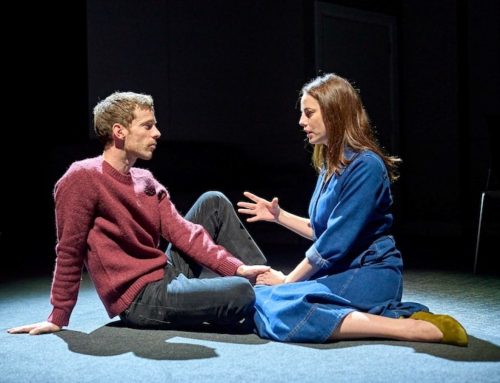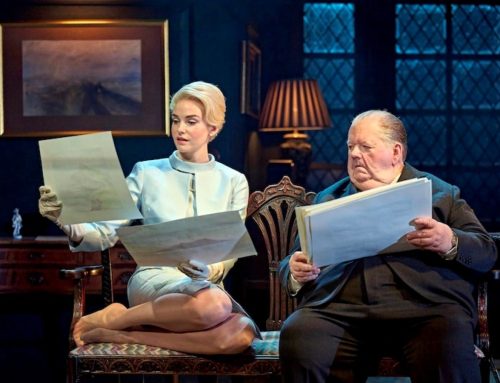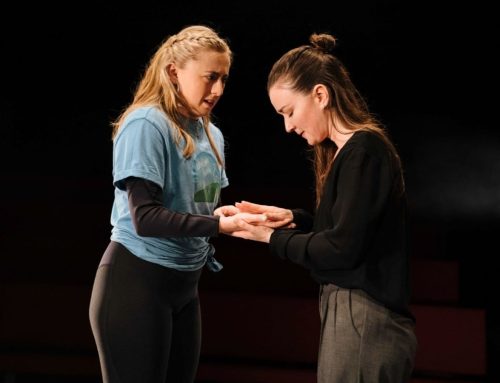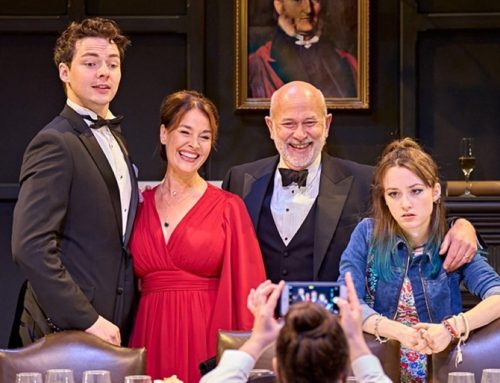Close to thirty years after its National Theatre debut, Tom Stoppard’s dense play about poet and classical scholar A.E. Housman, The Invention of Love, gets a welcome new production with a great cast at The Hampstead Theatre.
Director Blanche McIntyre directs with an eye for the piece’s many complexities, although one wishes she made better use of Morgan Large’s tremendous split-level set. Simon Russell Beale as the elder Houseman, and Matthew Tennyson as the younger, movingly reveal a central character who finds consolation in poetry and scholarship but remains haunted by an enduring love, one he can neither express nor attain. Indeed, the piece is as much about the denial of love as about its invention.
The Invention of Love opens with the elderly Housman on the banks of the River Styx after his death, awaiting Charon the ferryman (a brusque, blunt-speaking Alan Williams) who will carry him to the afterlife. Large’s thrust stage presents the Styx as a dark, brooding, swirling whirlpool set forward against a screen of white fog that extends up the rear wall. Lighting changes reveal a second stage area behind the fog screen. It is an impressive piece of design that McIntyre does not always know what to do with. A boat on wheels evokes lazy summer punts on Oxford’s Isis River.
From this dreamlike liminal space, the elder Houseman contemplates his youth in a seamless series of non-linear scenes, revisiting recollections, opportunities missed and taken, and real and imaginary encounters, including with his younger self. Characters drawn liberally from the worlds of scholarship, literature, and the classical world muse over poetry and philosophy over croquet or billiards, then disappear at pace. The narrative darts between Housman’s youth as a failing Oxford student, his later professional achievements as a poet and scholar, and his tortuous struggle to come to terms with his sexuality in a deeply homophobic society that disdains same-sex attraction as “beastliness”.
The central emotional tension of the piece emerges from Housman’s profound, undeclared yearning for fellow student Moses Jackson (a bumptious preening Ben Lloyd-Hughes – one wonders what on earth Housman sees in him), a fellow undergraduate at Oxford who remains oblivious to his suitor’s feelings. Jackson’s robust, jocose heterosexuality and conservative outlook contrast with Housman’s repression and romantic idealism, which the latter, lacking (or perhaps fearful of) other emotional outlets, channels into his work.
Housman’s central conflict emerges in a scene with Oscar Wilde (a richly textured, larger-than-life cameo turn from Dickie Beau). The counterpoint between the scholar’s repression and Wilde’s flamboyance highlights the denial of emotional fulfilment that Housman imposes (at least partly) on himself. To achieve redemption in the afterlife, Houseman must come to terms with what he has forbidden himself in his real life and invent a way of loving that he can be at ease with.
The central challenge with The Invention of Love is that its extended excursions into the nature of art, academia, and language, immensely erudite as they are, can come close to intellectual overload for those with little exposure to classics. The piece extends to a bum-numbing three hours, with portions delivered in Greek and Latin. Its focus on the high-brow pursuits of ageing white men (Florence Dobson’s sparky Katharine Housman is the only female on view), drawn mainly from the Oxford establishment, adds to the sense of emotional detachment already in the text (a perennial problem with Stoppard’s work). Some may find the milieu hard to grasp. All reasons, perhaps, why major revivals over the last three decades have been so few and far between.
McIntyre’s response to these challenges is to zip through the discussions of “art, morality, and social order” between the great and the good and slow down for the more interesting encounters between the elder and younger Houseman. “Shall we sit down before philosophy finds us out?” senior tells Junior, closing off the discussion of the improbability of such a meeting. It is a sensible directorial choice that gives the piece sufficient momentum, aided by two stonking central performances and many excellent turns in minor roles.
Tennyson’s profoundly melancholic younger Housman oozes vulnerability and hidden desire, gazing wistfully in the distance as if seeking a way to force love onto Jackson. Russell Beale’s elder Housman is a bully, radiating angry regret but warm, too, proud to have found some semblance of satisfaction through art. Housman’s workmate and potential love interest, Chamberlain (an excellent Michael Marcus), hints at the roads untaken in the scholar’s life. Stephen Boxer channels malign intent as Labouchère, whose 1885 law amendment destines generations of gay men to the pain of hidden lives. Dominic Rowan’s pompous Jerome K Jerome emotes fury over the “perversion that contributed to the fall of Greece and Rome”.
STAR RATING: 3.5 stars
Writer: Tom Stoppard
Director: Blanche McIntyre
More Recent Reviews
Playfight. Soho Theatre.
Writer Julia Grogan’s breathtakingly assured debut play arrives at Soho Theatre following stellar reviews at the Edinburgh Fringe and [...]
All The Happy Things. Soho Theatre.
Naomi Denny’s three-hander comedy-drama All The Happy Things covers familiar themes within a recognisable premise. A grieving protagonist comes [...]
Telly. Bread and Roses Theatre.
The challenge with absurdist comedy is that many people do not find it funny. Laughing at the sheer weirdness [...]






